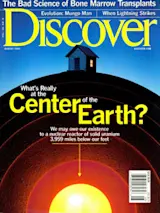Reeling From Wheeler It seems to me that the paradox of John Wheeler's cosmic-scale double-slit experiment ["Does the Universe Exist if We're Not Looking?" June issue] disappears if we view the problem from the perspective of the photon. As I understand it, time stops from the perspective of an observer traveling at the speed of light, like our photon. Also, distances are reduced to zero. So for the photon, its birth in the distant quasar and its observation on Earth occur simultaneously and at the same location. This concept of a history of a photon is a human perspective; the photon knows nothing of history. It is only our particular frame of reference that creates an apparent paradox.
Norman Horofker—Midland, Georgia
John Wheeler responds: Norman Horofker is absolutely right that for a photon, time stands still. However, in our frame of reference, a photon has a history and moves through ...














